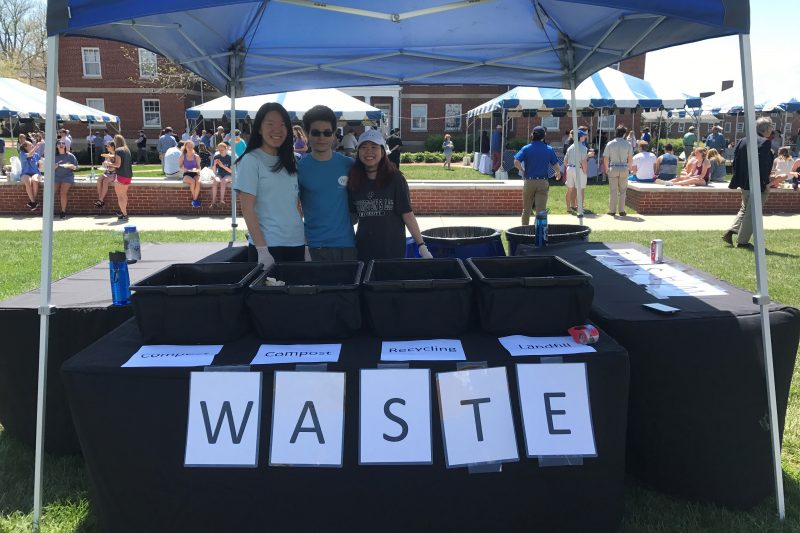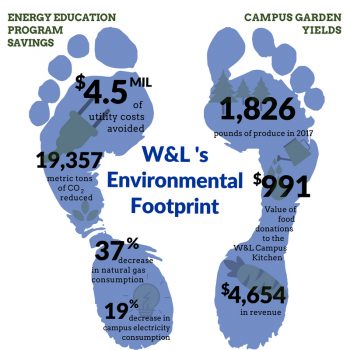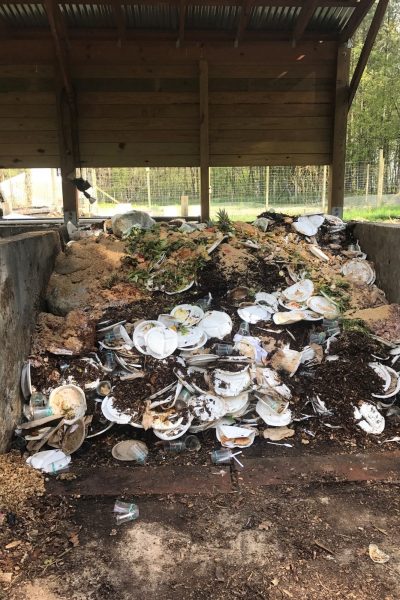W&L’s New Efforts Take Load Off Landfills Trash-sorting stations, one of the university's newest sustainability projects, send more material to recycling and compost bins instead of to the dump.
Serving sandwiches, salads and sweets to 1,500 guests on Cannan Green seems like it would generate piles of garbage, but this year’s Alumni Weekend luncheon produced just one bag of trash.
Dining Services, with help from the Office of Sustainability and University Facilities, accomplished this feat during both Alumni Weekend and Commencement this spring by setting up trash-sorting tents near the food-service area. These tents allow the university to send more materials to recycling and the compost pile, lightening the load on landfills and strengthening W&L’s commitment to sustainability.
At the trash-sorting tent, which replaces multiple trash cans placed around the venue, waste is collected and separated post-consumption. Guests separate their food waste, with tent workers ensuring that the sorting is done correctly. Trash tents fit seamlessly into an already imagined event space, making it more convenient to locate for guests and efficient for the volunteers.
“It has to work like a well-oiled machine,” said Director of Sustainability Initiatives and Education Kim Hodge, “because one wrong aluminum can or one wrong colored trash bag causes the contamination of a whole compost bay, and separating it through this dirt is not an easy task.”
In previous years, similar events with 1,200-1,500 guests produced at least four to five bags of trash, and sorting mishaps were unavoidable. Now, trash tents make front-end sorting faster and ease the back-end processing of waste. The workers stationed at these trash tents have been Dining Services staff, sustainability interns, paid Compost Crew members or other student volunteers.
After each event, tent workers take bags of recycling to the recycling bins and dispose the compost waste in the bays next to the Campus Garden. Use of the two compost bays has increased considerably since Dining Services purchased a $50,000 Somat pulper for the Marketplace kitchen this year. The pulper processes pre- and post-consumption food waste to make it compostable at the bays. It ultimately reduces the amount of trash the dining hall produces during food preparation and after meal service.
The pulper “allows us to better track how much waste we actually produce,” said Director of Dining Services Jennifer Hickey. “The waste is also more usable for compost because it breaks down faster once it has been shredded and pulped.”
After seeing the success of their efforts, Dining Services and the Office of Sustainability plans to expand their endeavors to reduce W&L’s carbon footprint.
They will set up trash-sorting tents at as many annual events as possible during the upcoming academic year. In addition, the Compost Crew will pick up compostable waste from all the campus dining locations, including the third-year housing restaurants, sorority dining facilities and the law school café. Additionally, Dining Services will switch to compostable containers and cutlery at all of their eateries, continuing efforts to reduce carbon emissions.
These new initiatives will increase the amount of compostable material W&L produces, demanding the expansion of the compost bays.
“Where once it used to take a whole semester to fill up one bay, it now takes not even a month,” said Ginny Johnson ’20, leader of the Compost Crew and a sustainability intern, “so we definitely need room to house all the compost we will produce.”
The expansion of the bays will support the growth of the W&L Campus Garden, with the compost enriching the existing soil in the garden, reducing fertilizer usage, improving produce quality and ultimately saving money.
Increase in compost helped yield over 1,800 pounds of fresh produce and approximately $4,700 in revenue in 2017 alone. All sustainability efforts at the university have saved $4.5 million in utility costs and reduced CO2 production by 20,000 metric tons.
“It is so satisfying to know what you are doing is having a positive impact on the world,” Johnson said.
 Trash-sorting tents at major events have been staffed by volunteers, like these students, and W&L staff.
Trash-sorting tents at major events have been staffed by volunteers, like these students, and W&L staff. .
. Compost bins near the W&L campus garden are filling up more quickly than ever before.
Compost bins near the W&L campus garden are filling up more quickly than ever before.
You must be logged in to post a comment.